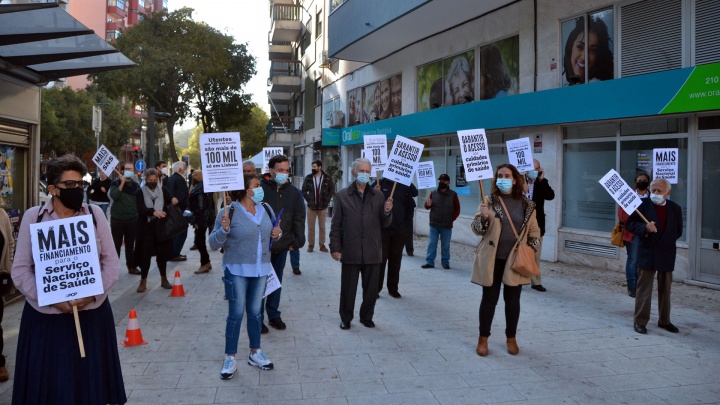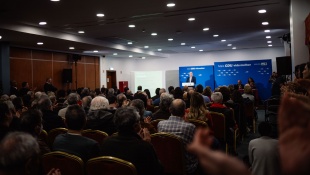The holding of this Public Forum, within the scope of the national action promoted by the PCP: “Fight COVID-19, recover delays, ensure access to healthcare”, aims, at this stage of the development of the epidemic, to draw attention to the situation which is found in primary healthcare, fundamental in the fight against COVID-19, in the recovery of delays and in ensuring access for all Portuguese to health care.
Some of the problems that Primary Healthcare faces today are not due to the epidemic.
The shortage of family doctors and nurses, difficulties in scheduling appointments, long queues at the door of the Healthcare Centres waiting for a vacancy that is hardly ever achieved, have only worsened with the epidemic.
When in March the National Health Service was confronted with the first cases of COVID-19, a situation that forced a reorganisation of services to respond to the epidemic, the PCP drew attention to the need to strengthen the SNS, otherwise, even if a positive response to the epidemic was given, as was the case, many Portuguese with other pathologies could be left behind with all the resulting consequences.
Following these alerts, the PCP presented in May, a National Emergency Plan to strengthen the NHS.
Based on a rigorous analysis of the work carried out in the months of March and April, the experiences gathered, the needs identified and the means necessary to fight the epidemic outbreak and regularise the normal activity in the provision of care, if the Plan presented by the PCP had been adopted and implemented, many of the problems that today affect the normal functioning of the NHS would have been overcome.
Life ended up proving that we were right.
The absence of a decided intervention to strengthen the public healthcare structure, the non-hiring of more professionals to meet the needs of the services, the non-opening of more beds for hospitalisation of patients with COVID-19, particularly intensive care beds, brought pressure on services and professionals to intolerable limits and caused delays, the consequences of which are unforeseen.
A National Plan that aims, among other measures: to end the underfunding that successive governments of the PS, PSD and CDS have subjected the NHS and that has acted as a garrotte in the functioning of the public service; to increase the mobilisation and modernisation of the diagnostic and therapeutic capacity installed in the NHS; to strengthen the number of professionals; to begin specialist training for all doctors able to start it; to increase the installed capacity to 800 severe case beds and reinforce the number of intensive care beds; to increase human resources in the area of public health.
This was not the option of the PS government and the results are in sight - more than 1 million appointments yet to be held, more than 150,000 surgeries not performed and which are now being transferred to private hospitals.
Seeking to step in the rain without getting wet, PSD and CDS, as if they had no responsibility in the situation, carry out on the political and ideological level, a brutal attack against the NHS, trumpeted on the ground by their cadres installed in institutions and organisations connected to health, with great support in the media, with which they seek to destroy the NHS, transferring a significant part of its activity to private groups in the healthcare area.
They say that the NHS is not in a position, by itself, to fight COVID-19 and guarantee normal activity and, therefore, the government only has to hand over to these groups a part of the NHS's activity, for which they demand the reinforcement of the NHS budget because, they say, this transfer has high costs.
That is, they are looking at the situation, not as an exceptional situation that may require exceptional measures, but only as a business opportunity.
They blow into the wind that it is necessary to bring together the public, private and social sectors and that only due to ideological reasons this option has not yet been made.
They speak as if they ignore that today, the economic healthcare groups, have contracted with the public service, a significant part of its activity and that they receive for this provision of services, a slice of the budget of the NHS in excess of 5,000 million euros per year.
Over the years, particularly in the last two decades, the process of acquiring services from the private sector by the NHS has not stopped growing.
There are even some fundamental services in the provision of care, which today are practically in private hands and which should have be internalised in the NHS, as is the case with diagnostic and therapeutic tests whose cost to the NHS is more than 500 million euros a year, or haemodialysis, where private institutions hold 98% of the care provided with costs for the NHS of around 300 million euros.
A shame, comrades and friends, because even where there are conditions to perform these acts in the hospital units of the NHS, the option is often to have it done outside.
A campaign that reached a point where the President of the Republic himself came to announce that negotiations were underway with the Regional Healthcare Services to contract private participation in this joint effort, as is said.
The latest news confirms that the campaign is having the desired effect, with agreements already signed and patients being transferred to private hospitals.
Without calling into question all the solutions that the situation requires, we reaffirm that treating patients in the public and in the private sector is not the same thing. While in the public sector the logic of providing care is health, in the private the logic is disease. Above all, what matters is the number of medical acts, reflected in the final bill and the guarantee of payment.
The option that has to be made today, as before, and if there is still time, is to strengthen the NHS and not follow a path that, sooner than later, will lead to the destruction of the NHS and the creation of a healthcare system based on the interests of privates and not of the Portuguese.
The health situation is worrying. The epidemic has been growing without the public health structure, where hundreds of professionals are in shortage, including doctors, nurses and other technicians, being able to stop the progress of the disease. A decisive structure for the location, monitoring of contagion chains and for their interruption.
In this context of shortcomings affecting the NHS and the provision of care, shortcomings that are obvious in the proposal of the State Budget, the PCP will not fail to intervene in the framework of the debate of the Budget specifics with a set of proposals that embody, not only to the National Emergency Plan, but to a set of fundamental investments to equip the units of the NHS with the instruments that contribute to the fulfilment of their mission.
It is not enough to take measures that condition the life of the Portuguese.
Measures that are sometimes difficult to understand due to the fact that they are both absurd and inefficient, as was the case with the travel limitations of millions of Portuguese, or with the Law adopted by the Assembly of the Republic on the mandatory use of the mask, in addition to its supervision being left to a space of discretion that will certainly be the source of multiple situations of discrepancies, undesirable conflicts and potential abuses of power, it emphasizes a line of individual responsibility that cannot, in any way, be accepted as substitution measures that are necessary in view of the evolution of COVID-19, above all the strengthening of the NHS.
Two paths are under decision in the coming months: the defence and strengthening of the NHS to ensure the right to healthcare, with the application of the emergency plan for its strengthening, or the withering of the NHS and its structures, channelling public funds to increase the profits and power of monopoly healthcare groups.
The call of the PCP is for the workers, democrats, all those who over the years have kept standing this important achievement of April, which is the National Health Service, to consider its defence as a national imperative.




